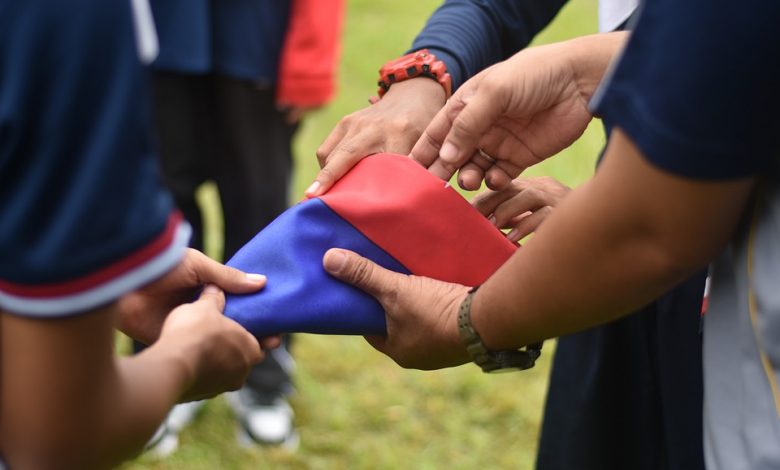Connexion: Live for humanity to save the nation from thieves


By Joachim Ng
Sergeant Jasmine and Inspector Wong are a Bonnie and Clyde team of fictitious law enforcers who may call you if they haven’t done so yet. Dozens of these spell-casting fraudulent pairs make calls every day, and each call is a dial of fortune for them. But for the nation, it’s a dial of destiny with devastation.
Scammers have discovered that there is magic in teaming up a “police sergeant” and a “police inspector” — with the stern inspector playing the bad guy who wants to throw you in jail, and the nice sergeant offering you a smooth way out of trouble.
This scam works by instilling in you the fear that police are coming to lock you up. However, it isn’t the biggest crime that the police are fighting. Aha, you may think the prize goes to corruption. Wrong. Scamming and corruption are only the manifestations, just like heat waves are manifestations of climate change.
Malaysia’s biggest crime wave is pervasive dishonesty rooted in the ethic of living for self, family and narrow interest groups. Self-centeredness is the basic nutrient feeding pervasive dishonesty that will tear apart the fabric of Malaysian society.
As it is, corruption in the civil service and the greed of influential politicians bent on enriching their families and friends have over many decades seen colossal amounts of public funds lost to leakages and irregularities. Corruption also distorts the economy, as business owners find it necessary to pay bribes in order to get licence approval.
While corruption weakens the effectiveness of government and impoverishes the nation, phone scams destroy trust in law enforcement, heighten the risk of depression and critical illnesses in victims who have lost all their savings, and drain wealth from the economy. In total, there are more than 10 types of scams perpetrated through online networks. A cool RM2 billion have been siphoned off over a 42-month period.
Last June, a 67-year-old retiree in Taiping was told by a fake police officer over the phone that she was involved in money laundering and drugs. To avoid arrest she transferred all her savings of RM101,887 to a new bank account, the details of which she revealed to the scammers who withdrew all the money in one day.
In May, a 74-year-old Perakian civil service retiree lost RM845,450 to conmen who posed as police and Inland Revenue Board officers to accuse him over the phone of tax arrears and the usual drug trafficking and money laundering. The victim transferred his money via ATM to 14 bank accounts owned by different people over a 10-day period.
A year before that, a 72-year-old Perakian retiree was accused by a fake cop of having prohibited items in an unclaimed package at the post office and that he was involved in the usual two crimes. He transferred RM60,000 to two mule accounts. In April this year, a Sarawakian retiree lost RM1.2 million after being accused of money laundering.
Retirees aren’t the only victims. Early July, a 38-year-old woman in Teluk Intan had the misfortune of being fooled by “Sergeant Jasmine” and “Inspector Wong” who told her to deposit all her savings into mule accounts to avoid being arrested for investigations into money laundering and human trafficking. She lost RM217,000.
A Johor dentist in his 40s lost RM220,000 after a fake policeman threatened to arrest him and throw him into the lockup. Over a two-month period this year, a 46-year-old woman in Kuala Lumpur was duped of RM100,000 by a fake sergeant and fake inspector who had threatened to arrest her. Even politicians who usually outtalk most people can get scammed. A state assemblyman in Kelantan lost RM84,000 when a bogus tax officer and two bogus cops accused him of being in arrears.
On average, four persons a day are being duped by fake sergeants and inspectors. Alarm bells should ring all over Malaysia for several big reasons:
PERVASIVE DISHONESTY. Like weeds, dishonesty is spreading over the entire society. Just as politics or the civil service has long been seen by greedy persons as routes to wealth, scamming has become an easier third pathway offering big career opportunities for under-18s and young adults. The vocational lure is highly attractive with professional trainers conducting workshops on psychology and use of pressure tactics.
Dishonesty has also gotten a facelift to make it appear legitimate. A “likes” scam invites you to post likes for products that are supposedly being promoted. After you get paid small sums for your effort, you are induced to invest hundreds of ringgit that spiral upwards to thousands of ringgit. At some point, you lose everything.
While only the slick talkers and IT buffs can make it as high-flying scammers, hundreds or thousands more are happy with the crumbs they get from “renting out” or selling their bank accounts to be used as mule accounts for depositing loot.
Not to be outdone, conventional thievery is also on the upsurge. Many industrial plants, factories, construction sites, and agricultural farms are stealing pool-sized volumes of water through illegal tapping. Water theft cases almost doubled last year, and the cumulative loss over five years has reached RM29 million.
Underground copper cables are being stolen, leaving housing areas without telecommunication links, and thieves are also removing the reinforced bars inside manhole covers. You may slip into a drain that has had its cover removed or weakened.
The livelihoods of freshwater fishermen have been severely affected by factory owners who dishonestly convince themselves that it is all right to dump chemical waste into rivers by the lorry loads.
Down the line, there are workers who think of Socso as easy game and they submit fraudulent claims. Numerous attempts at such cheating reveal how widespread dishonesty has become.
Desperate for students, many private institutions of higher learning are bombarding school-leavers with hand phone messages offering all types of study courses with dubious claims of government recognition or sponsorship. The weeds of dishonesty are now showing up in education. That should be the last place.
DIRTY LIVING. The biggest mark of this bad ethic of living for self, family, and narrow interest groups is dirty living. Some journalists last month visited public toilets and interviewed the cleaners. “Nothing has changed,” said one cleaner. Users wet the floor and strew it with tissue paper and all kinds of trash including used sanitary napkins. One toilet cleaning service manager lamented that on heavy usage days, the toilets get clogged with debris thrown in and taps go missing.
The Local Government Development Ministry has launched a BMW-grade toilet initiative to improve the cleanliness (bersih), attractiveness (menawan) and fragrance (wangi) of all public toilets. But to make it work, rope in the Ministry of Education and recruit Japanese teachers. Toilet cleaning is one of the most important lessons taught in all Japanese schools, as the Japanese recognise that clean living starts with the body and extends to the mind.
Conversely, dishonesty begins at the physical level with dirty living that then infects the mind. If we educate the people from kindergarten level upwards to wash school toilets, they will extend this habit of clean living to the financial arena and avoid earning dirty money through scams and corruption.
Japanese schools teach students to practise the global ethic of living for humanity. So, you can absentmindedly leave your handphone on the cistern of a public toilet in Japan and find that it is still there when you rush back 30 minutes later to retrieve it. In Malaysia, if you leave your handphone in a public toilet, or for that matter in any place where people come and go, your handphone will be gone in seconds.
Perhaps you avoid the public toilets. But your eyes cannot escape seeing the presence of litter everywhere. The indiscriminate throwing of litter and dumping of rubbish by the public is matched by the dishonesty of cleaning service workers who get paid and yet leave drains clogged and litter unpicked.
The usual litter spots include walkways, roadsides, road corners, road dividers, signage stands, drains, green patches, shop-row frontages, planter boxes, parks, train station entrances, rivers, picnic spots, waterfall campsites, and beachfronts. Only the expressways, main city thoroughfares, central business districts, and key tourist sites are free of litter.
In most housing estates, your eyes will be drawn to piles of garbage at road corners, road-sign boards, and back alleys. Last May 1, a public holiday, a resident took a walk at Ipoh Padang and found the field littered with rubbish such as plastic bags and bottles, drink cans, and food waste. There were Aedes mosquitoes in the stagnant drain water.
Litter isn’t just unsightly. It poses a health danger as garbage piles are breeding spots for killer mosquitoes, rats, cockroaches, other vermin, and bacteria that will attack you.
Tourists returning from Japan tell wonderland tales of seeing “No Littering” signs on walkway pavements and hearing the locals say “hai” in agreement. A research manager touring Japanese cities last month was asked to keep an eye out for litter. She could not spot a single piece of discard at any place she visited.
TRUST DESTRUCTION. Over a stretch of decades, the erosion and eventual dissolution of trust among citizens as well as trust in authority will loosen the ties that bind a society together resulting in its collapse. Why do pervasive dishonesty and dirty living pose such a grave risk to society? Humans are social beings. We cannot survive alone, but must live in groups where all persons cooperate on the basis of trust.
Orang Asli tribes were noted for their integrity because no one cheated another. Beginning 12,000 years ago, tribal societies enlarged through mergers to eventually form civilisations that would survive so long as there was trust among people enabling cooperation to develop. When the bonds of trust were dissolved, a civilisation collapsed.
Evidence that trust and cooperation are being eroded throughout Malaysian society is now glaringly visible in the surge of ethno-religious politics. Communities are falling back on themselves instead of deepening our national multicultural identity, in the belief that there is still trust amongst people of the same race and religion. But wide economic disparities within the same community will similarly erode trust, and citizens will then retreat into micro-communities suspicious of all other groups in our society.
The nation’s historical error lies in failing to teach and practise the global ethic of living for humanity. So all the post-Merdeka generations developed the ethic of living for self, family, and narrow interest groups.
To crush pervasive dishonesty and dirty living, the Prime Minister needs to command all educational and religious institutions to promote the global ethic of living for humanity. This ethic recognises the interconnectedness and interdependence of individuals regardless of their ethnicity, culture, or religion. It emphasises the importance of fostering cooperation, empathy, and solidarity in addressing societal challenges and promoting the wellbeing of all people.
Any nation that does not live for humanity will go the way of extinction.
====================================
Disclaimer: The views and opinions expressed in this article are those of the author and do not necessarily reflect the official policy or position of Ipoh Echo


